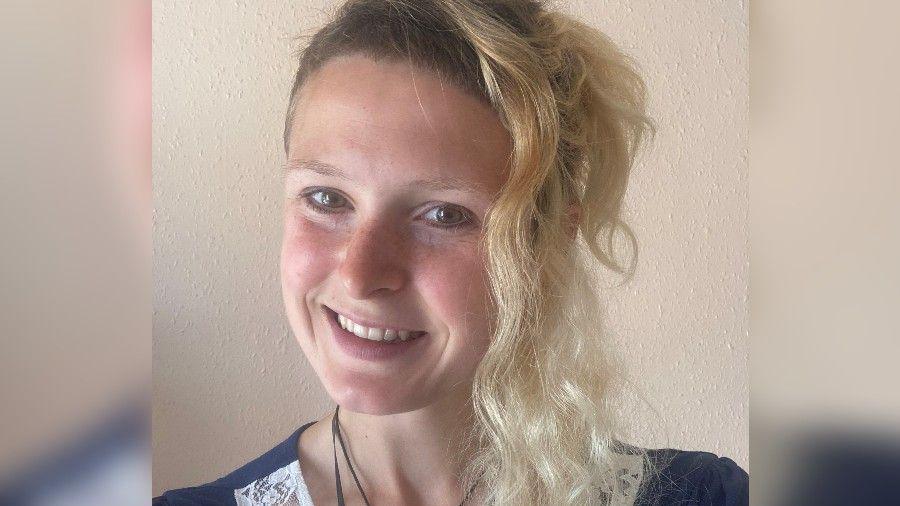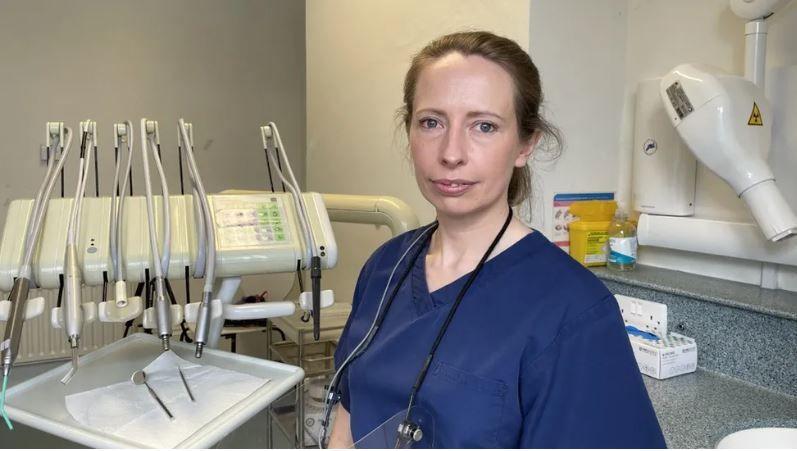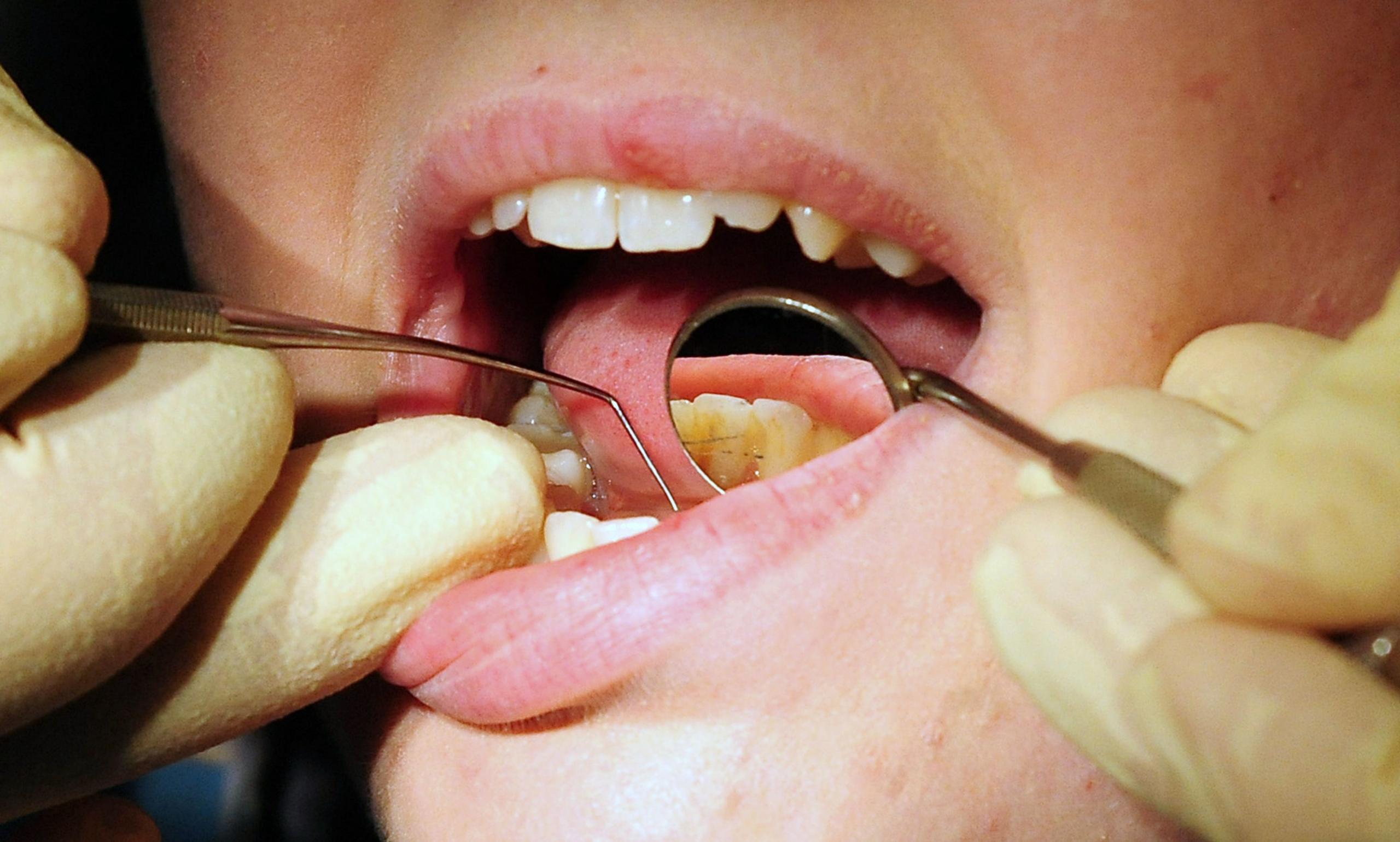Why can't I get an NHS dentist?

Emma said she had not seen an NHS dentist for six months
- Published
With more dentists in Cornwall and Devon reducing their NHS commitments, what are the political parties saying they will do about the situation?
Emma, from the South Hams in Devon, used Your Voice, Your Vote to suggest the BBC looked into the state of dentistry.
She said she had been without an NHS dentist for six months after the one she had used since childhood withdrew NHS provision.
"It felt really rubbish [losing my NHS dentist], especially as I was due my next check up,” the 27-year-old said.

Dentist Jenna Murgatroyd said there was "very real risk of bankruptcy working within the NHS"
"There was an inevitability to it as I'm not the first person I know to be affected by this," she added.
Figures from the British Dental Association (BDA) last year showed nearly 60% of dentists in south-west England were looking to reduce their NHS commitments.
Emma said: "It seems the whole system needs a whole review. If they can't offer NHS dentistry to everybody, it would be great to see those in power looking at why that is."
Jen Smith, the BBC South West's health correspondent, said most of the UK's NHS dentists were independent businesses and not employed by the health service directly.
She said: "The costs dentists incur for NHS patients isn’t covered by the funding they receive.
“It’s much more financially viable for a dental surgery to cover its costs with private patients."

'Breaking point'
Last year, Jenna Murgatroyd, who has a dental practice in St Agnes, said NHS dentistry in Cornwall was close to breaking point.
A year on, she said she thought the pressure was now even worse and "we're hanging on by a thread".
She said: "[We are] wanting to be part of a force for good, as the NHS is intended, but there will be a breaking point and we've been very, very close to that.
"There's a very real risk of bankruptcy working within the NHS, and, of course, that means I have to make very difficult decisions about the future of the practice.
"It's really difficult being able to sleep at night not knowing whether I'm going to have the funding to stay open or pay staff or look after patients in the way that we're trained to look after them."
BDA chairman Eddie Crouch said "we're probably at the worst point of NHS dentistry that we've ever seen" at the moment.
He said: "This general election is quite pivotal in making the service something that will survive into the future."

The British Dental Association said nearly 60% of South West dentists last year were looking to reduce NHS commitments
So what are the political parties offering?
BBC South West’s political editor Martyn Oates said there had been widespread agreement for 15 years on the main action needed, which was to reform the contract that failed to pay dentists properly for the NHS work they did.
The current contract was introduced by the last Labour government, but it concluded before the 2010 general election it had made a mistake and needed to change tack.
The present government’s long-awaited Dental Recovery Plan, published earlier this year, stopped short of this fundamental reform.
The BDA condemned the plan as “unworthy of the title” and said “failure to embrace fundamental reform of NHS dentistry risks condemning a generation to decay and widening oral health inequality”.
The Conservatives said their plan could see up to 2.5-million additional NHS dental appointments delivered for patents through measures including increased minimum payments for NHS work, one-off financial incentives to some NHS dentists and rolling out dental treatment vans in rural areas.
Labour has pledged to reform the national dental contract and provide an extra 700,000 urgent dental appointments.
The party said it would offer incentives for new dentists in areas of greatest need and shift the focus to prevention so that, in the long-term, everyone who needed NHS dentistry could access it.
Liberal Democrat policy is to reform the dental contract and increase funding for the NHS dental contract, plus increase the number of dental training places in the UK.
The Lib Dems also said they would remove VAT on children’s toothbrushes and toothpaste.
The Greens said they would offer everyone access to an NHS dentist through their promise of extra spending on health and social care, rising to more than £50bn per year by 2030.
The healthcare policies so far announced by Reform UK include zero basic-rate income tax for front-line health and social care staff, and 20% tax relief on all independent healthcare and insurance.
Follow BBC Cornwall on X (formerly Twitter), external, Facebook, external and Instagram, external. Follow BBC Devon on X (formerly Twitter), external, Facebook, external and Instagram, external. Send your story ideas to spotlight@bbc.co.uk, external.
